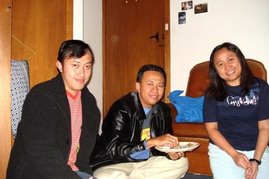Kathleen Holder
Posted by Amanda Katili, 18 Jan 2006
Wants to have fun and make a difference? Plays soccer, lacrosse, Wiffle ball and poker. Volunteers at a local homeless shelter and raises money for tsunami relief. Can talk urban slang like a hip-hop deejay and write fluently in text- messaging shorthand. Liberal to middle-of-the-road politically. Got As in high school but feels like an imposter in freshman honors class.
Goes home weekends. Calls parents on the cell phone between classes.
Today’s students tend to be pressured, achieving, plugged in to technology, multicultural, eager for extracurricular and community activities, anxious for clear rules and close to their parents, according to faculty, administrators, counselors, advisers and students themselves.
At UC Davis, like campuses nationwide, it’s the dawning of the age of the Millennial Generation. Born since 1982 to the smallest families in U.S. history, these students are also called Echo Boomers, Nexters and Generation Y. And they—and their Baby Boomer parents—are making their presence felt on campus in a big way.
“This is a generation that has a lot of attention paid to it by their parents and the national media,” said Bob Filipczak, co-author of two books on generational differences. “That’s partly because this is a huge generation: 76–79 million, compared to 59 million Generation X and 76 million Boomers.
“They are going to have as big an effect on our culture, our economy, as the Boomer generation—perhaps more so,” said Filipczak.
At UC Davis, they already are. The first Millennial Generation students started their freshman year in fall 2000. Achieving, group-oriented and stressed, they have been flocking to internships, student clubs, intramural sports and, more so for women than men, to the counseling center.
Tech-savvy, they sometimes fluster their professors with their ease with multi-tasking—laptops open, taking notes, instant messaging and e-mailing friends, and reading online news in class all at the same time. They may do more research at an Internet café than in the library. And they let instructors know when they stray from course syllabi.
They are bright, but increasingly insecure. Two-thirds of freshmen in a recent survey earned A- to A+ grades in high school. Eight out of nine took Advanced Placement courses. But in recent surveys, fewer rate themselves above average for academic ability and emotional and physical well-being.
The campus, in recent years, has responded with new programs for both students and parents, including the award-winning Aggie Family Pack e-mail newsletter and the parent section of this magazine, organized recreational activities, online services and stress-reduction programs.
Administrators are also looking into ways to better help graduating seniors enter a work world that may not meet their high expectations.
A dozen campus officials recently attended a UC-wide retreat on strategies for serving the Millennial Generation, exchanging ideas for best meeting the needs of these students.
Of course, these are generalizations and at UC Davis a number of students don’t fit the Gen Y mold. They are not the offspring of affluent Baby Boomers, but come from immigrant families. Most of these students were born in the United States, but have at least one parent who immigrated here from another country—China, Mexico, Vietnam, Philippines and elsewhere around the world.
And while the number of students from rich, $200,000-a-year-plus-income families has increased slightly over a generation ago, the proportion whose parents earn less than $40,000 a year has doubled to 30 percent.
UC Davis students are multicultural and multiracial—even more so than their counterparts nationwide.
Though many students grew up in segregated neighborhoods, they are connected to the world in ways previous generations were not—via the Internet and the global beat of music, movies and cable television. Cultural distinctions seem to blur on campus, as students are exposed to new ideas—and to each other.
In dress, UC Davis students look a lot alike. They wear jeans, shorts, T-shirts, athletic shoes, flip-flop sandals—though, in “Aggie Style” profiles in the California Aggie, students say they spend from a few dollars to more than $800 on their outfits. Hairstyles tend to be less flashy. Mostly gone are the extreme hair and makeup colors, black “Goth” look, the punk spike and Mohawk hairstyles. Low-hanging “baggies” are less common. So too are platform and steel-toed boots.
Ask students what music they listen to, and they’re likely to say “All kinds” and list a wide array from ’70s rock and R&B to country, classical, jazz, hip-hop, rap and international pop.
Amidst conformity, they are each quite individual.
Wolfgang Rougle, a senior in international development who changed her first name in eighth grade in honor of physicist Wolfgang Pauli, said: “Kids my age don’t seem to feel they have to do something dramatic—like dye their hair green or listen to death metal—in order to be individual. Everyone believes that she’s special and unique just the way she is….
“I always was told I could be anything I wanted to be.”
Monday, July 23, 2007
Subscribe to:
Post Comments (Atom)

No comments:
Post a Comment